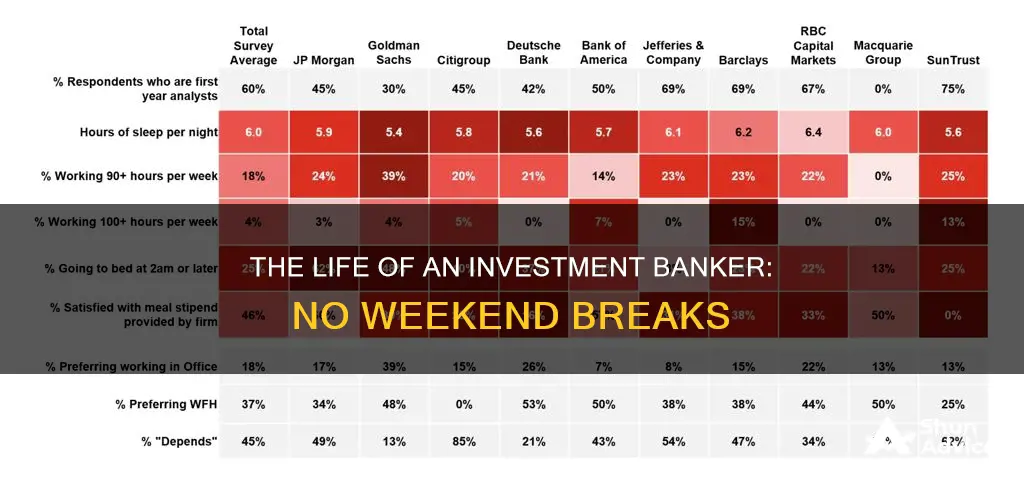
Investment bankers are known for working long hours, with some weeks exceeding 100 hours. The work week for an investment banker typically falls between 60 and 80 hours, with some bankers claiming to work 105-120 hours per week. The number of hours worked depends on the company, the market, and the seniority of the banker. Senior bankers may work fewer hours due to their experience and expertise, while junior analysts are often tasked with financial modelling, presentation building, and other time-consuming tasks. Investment bankers often work weekends, especially if there are live deals in progress, and travel across time zones to meet with clients. While the hours are grueling, investment bankers are well-compensated, with first-year analysts earning base salaries of up to $110,000.
| Characteristics | Values |
|---|---|
| Average number of work hours per week | 48 hours |
| Entry-level employee work hours per week | 40 hours |
| Senior management work hours per week | >40 hours |
| First-year investment banking analyst work hours per week | 95-100+ hours |
| Typical work week | 60-80 hours |
| High-intensity work week | 100+ hours |
| Workday start time | 7am-9am |
| Workday end time | 7pm-3am |
| Weekend work | Yes |
| "All-nighters" | Yes |
What You'll Learn

Work hours depend on company, sector, and seniority
The number of hours worked by investment bankers depends on a variety of factors, including the company they work for, the sector they work in, and their level of seniority.
In terms of company, some organisations have introduced initiatives such as "Protected Saturdays" or "Protected Weekends" to guarantee analysts a full day off on Saturdays. However, enforcement of these programs varies, and analysts may still work on Saturdays in emergencies or when dealing with live deals. Elite boutique banks, due to their small-team capacity, may not be able to offer these initiatives. Additionally, some companies may have a "pay your dues" culture, where first-year analysts are given a heavier workload.
The sector an investment banker works in also influences their work hours. If they are in a ""hot industry", they are more likely to work longer hours. Investment bankers also need to be responsive to new developments in the market and clients' needs, which may require working outside of traditional business hours.
Seniority plays a significant role in determining work hours. Entry-level employees can expect to work around 40 hours per week, while senior management positions may involve significantly more hours due to increased responsibilities and managing large teams. However, it is important to note that as investment bankers gain seniority, the hours worked per week tend to decrease. Higher-ranked bankers have more flexibility in their schedules and can complete their tasks without supervision.
Ratios Reveal: Investing Insights
You may want to see also

Long hours are the norm
The number of hours worked also depends on the market and the seniority of the banker. Entry-level employees can expect to work around 40 hours per week, while senior management may work significantly more as they take on more responsibilities. As investment bankers gain seniority, from analyst to associate to vice president, the hours worked per week decrease.
The long hours are often due to the need to respond quickly to new developments in the market and work with clients worldwide across different time zones. Investment bankers are also expected to be on call for most days and nights, as live investment banking deals can bring unpredictable, last-minute adjustments. For example, an unexpected buyer might put in a last-minute acquisition bid for a company.
The competitive nature of the industry also contributes to the long hours, as bankers aim to be the most responsive to client needs. Additionally, there is a cultural aspect to the long hours, with those higher up in the ladder expecting new analysts to work the same hours they did. However, some banks have introduced initiatives like "Protected Saturdays" or "Protected Weekends" to address the issue of long working hours and improve employee retention.
Forging Checks: A Risky Investment Gamble
You may want to see also

Weekend work is common
The investment banking industry is also known for its long hours, with the typical workweek filling 60-80 hours. However, this can vary depending on the company and the deals at hand. Some weeks can be far in excess of this, especially if there is a "live deal" in the works. For example, a former summer associate at a bank reported that before he left IB, he was working 105-120 hours a week. This is supported by a 2021 Goldman Sachs Working Conditions Survey, which found that first-year investment banking analysts work more than 95 hours per week, on average.
The long hours in the industry have become embedded in the industry's culture, with those higher up the ladder sometimes believing that because they worked long hours as analysts, new analysts should as well. However, there is a shift towards healthier and more sustainable hours, with the 2021 Goldman Sachs survey suggesting capping the workweek at 80 hours.
The hours worked by investment bankers also depend on the sector's active deal flow. If an investment banker is working in a hot industry, they can expect to work more hours. For example, bankers at big-name bulge bracket banks may work on weekends because they are on call for most days and late nights. This is due to live investment banking deals, which can bring in last-minute adjustments, such as an unexpected buyer putting in a last-minute acquisition bid for a company.
Note Buying: Unlocking the Power of Debt Investments
You may want to see also

All-nighters are sometimes required
The hours worked by investment bankers can vary depending on the company, the market, and the deals at hand. On average, investment bankers work 60–80 hours per week, but this can increase to over 100 hours per week in some cases. First-year analysts may work even longer hours, with an average of 95–120 hours per week, according to some sources. However, not every moment during this time is spent actively working, and a lot of time is spent waiting for feedback from senior bankers.
The competitive nature of the industry also contributes to the long hours. Bankers want to be the most responsive to clients and be seen as "top of mind". This can lead to a cycle of long hours and a poor work-life balance, which may impact the mental and physical health of employees.
To address this issue, some banks have introduced initiatives like "Protected Saturdays" or "Protected Weekends" to guarantee analysts a full day off on Saturdays and improve their work-life balance. However, enforcement of these programs may vary, and analysts may still need to work on Saturdays for emergencies or live deals.
While all-nighters and very late nights are sometimes required, they are not a daily occurrence for investment bankers. The long hours are often reserved for particularly busy periods or when dealing with complex international projects and multiple live deals.
Investing in People: The Church's Role
You may want to see also

Work-life balance is poor
The long hours are not limited to analysts; associates and vice presidents may also experience them, although their hours tend to decrease as they gain seniority. However, higher-ranked bankers have more responsibility and accountability for the deals they handle.
The demanding schedule can be attributed to several factors. Firstly, the competitive nature of the industry encourages bankers to hustle and be highly responsive to clients' needs, sometimes creating a perception of urgency even when it may not be necessary. Secondly, the complexity of large deals and the need for consistency in client work can hinder efficient time management. Hiring more analysts to distribute the workload may lead to inconsistencies, as seen in the example of multiple analysts working on a single 10,000-row Excel spreadsheet.
The work culture also plays a role in the extensive hours. A "pay your dues" mentality is prevalent, where first-year analysts are burdened with a heavier workload, perpetuated by managers who believe in replicating their own experiences. This cycle continues as those who endured harsh conditions as junior analysts impose similar expectations on their juniors when they advance in their careers.
The impact of these long hours on bankers' health and well-being is significant. A 2021 Goldman Sachs Working Conditions Survey revealed a decline in employee mental and physical health, as well as a decrease in their intention to remain with the company. However, there is a glimmer of hope, as the survey also recommended capping the workweek at 80 hours and implementing initiatives to improve employee health and happiness.
While the nature of the industry may always involve long hours, initiatives like "Protected Saturdays" or "Protected Weekends" introduced by some companies aim to provide analysts with guaranteed time off to prioritise their well-being.
Wealth: Security, Freedom, and Legacy
You may want to see also
Frequently asked questions
Investment bankers are known for working notoriously long hours, often exceeding 60 hours per week. While the number of hours worked depends on the company, the market, and the deals at hand, it is not uncommon for investment bankers to work on weekends and even pull all-nighters. However, some banks have introduced initiatives like "Protected Saturdays" or "Protected Weekends" to guarantee analysts time off for rest and recovery.
The working hours of an investment banker can vary depending on several factors. These include the company's policies, the industry, the size of the company, the market, and the level of seniority. Senior-level employees tend to have more flexible schedules and may not work as many hours due to their experience and expertise.
A typical workweek for an investment banker can include long hours, ranging from 60 to over 100 hours per week. They may work on weekends and have unpredictable schedules due to the dynamic nature of the industry. A typical day might involve meetings, administrative tasks, financial modelling, research, and travelling worldwide to meet with clients.







